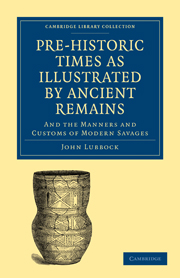Book contents
- Frontmatter
- PREFACE
- Contents
- DESCRIPTION OF THE FIGURES
- DESCRIPTION OF THE PLATES
- CHAPTER I ON THE USE OF BRONZE IN ANCIENT TIMES
- CHAPTER II THE BRONZE AGE
- CHAPTER III THE USE OF STONE IN ANCIENT TIMES
- CHAPTER IV TUMULI
- CHAPTER V THE LAKE-HABITATIONS OF SWITZERLAND
- CHAPTER VI THE DANISH KJÖKKENMÖDDINGS OR SHELL-MOUNDS
- CHAPTER VII NORTH AMERICAN ARCHÆOLOGY
- CHAPTER VIII CAVE-MEN
- CHAPTER IX THE ANTIQUITY OF MAN
- CHAPTER X ON THE ANTIQUITY OF MAN—continued
- CHAPTER XI MODERN SAVAGES
- CHAPTER XII MODERN SAVAGES—Continued
- CHAPTER XIII MODERN SAVAGES—Conclusion
- CHAPTER XIV CONCLUDING REMARKS
- APPENDIX
- INDEX
- Plate section
CHAPTER XIV - CONCLUDING REMARKS
Published online by Cambridge University Press: 07 September 2011
- Frontmatter
- PREFACE
- Contents
- DESCRIPTION OF THE FIGURES
- DESCRIPTION OF THE PLATES
- CHAPTER I ON THE USE OF BRONZE IN ANCIENT TIMES
- CHAPTER II THE BRONZE AGE
- CHAPTER III THE USE OF STONE IN ANCIENT TIMES
- CHAPTER IV TUMULI
- CHAPTER V THE LAKE-HABITATIONS OF SWITZERLAND
- CHAPTER VI THE DANISH KJÖKKENMÖDDINGS OR SHELL-MOUNDS
- CHAPTER VII NORTH AMERICAN ARCHÆOLOGY
- CHAPTER VIII CAVE-MEN
- CHAPTER IX THE ANTIQUITY OF MAN
- CHAPTER X ON THE ANTIQUITY OF MAN—continued
- CHAPTER XI MODERN SAVAGES
- CHAPTER XII MODERN SAVAGES—Continued
- CHAPTER XIII MODERN SAVAGES—Conclusion
- CHAPTER XIV CONCLUDING REMARKS
- APPENDIX
- INDEX
- Plate section
Summary
I HAVE already expressed my belief that the simpler arts and implements have been independently invented by various tribes, and in very different parts of the world. Even at the present day we may, I think, obtain glimpses of the manner in which they were, or may have been, invented. Some monkeys are said to use clubs, and to throw sticks and stones at those who intrude upon them. We know that they use round stones for cracking nuts, and surely a very small step would lead from that to the application of a sharp stone for cutting. When the edge became blunt, it would be thrown away, and another chosen; but after awhile accident, if not reflection, would show, that a round stone would crack other stones, as well as nuts, and thus the savage would learn to make sharp-edged stones for himself. At first, as we see in the drift specimens, these would be coarse and rough, but gradually the pieces chipped off would become smaller, the blows would be more cautiously and thoughtfully given, and at length it would be found that better work might be done by pressure than by blows. From pressure to polishing would again be but a small step. In making flint implements sparks would be produced; in polishing them it would not fail to be observed that they became hot, and in this way it is easy to see how the two methods of obtaining fire may have originated.
- Type
- Chapter
- Information
- Pre-historic Times as Illustrated by Ancient Remains, and the Manners and Customs of Modern Savages , pp. 473 - 492Publisher: Cambridge University PressPrint publication year: 2010First published in: 1865



